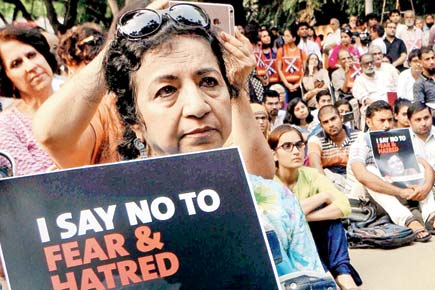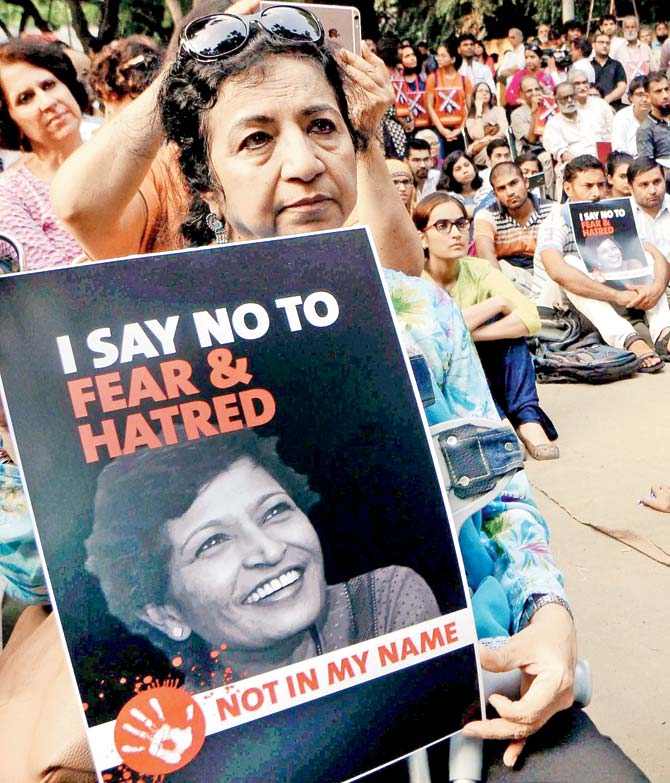Kalburgi, Lankesh are gone and there is almost no doubt that anyone who disagrees with a particular mindset and ideology is in danger


Delhi citizens at a 'Not in my name' protest against Gauri Lankesh's death last week
 When writers, intellectuals, scientists, scholars, academics, artists and artistes started returning their various awards in 2015, after the murder of writer MM Kalburgi in Dharwad, they were vilified and excoriated by many "patriotic" Indians for daring to complain about the atmosphere of intolerance creeping into India.
When writers, intellectuals, scientists, scholars, academics, artists and artistes started returning their various awards in 2015, after the murder of writer MM Kalburgi in Dharwad, they were vilified and excoriated by many "patriotic" Indians for daring to complain about the atmosphere of intolerance creeping into India.
ADVERTISEMENT
'How dare anyone claim that there was intolerance in India' was one argument made by those who disagreed. The supporting argument was its exact opposite and made by the same people - that India had always been intolerant. Some film stars and public personalities, who felt that the 'award wapsi' crowd were just needlessly attacking the BJP and Narendra Modi, went on protest marches to prove that India was 'tolerant'.
Two years later, after the murder of journalist Gauri Lankesh (like Kalburgi, she was openly opposed to Hindutva) in Bengaluru, there is almost no doubt that anyone who disagrees with a particular mindset and ideology is in danger. And not just danger from online abusers. But real danger - death. There are also legal threats as a means of harassment and warning. Historian and writer Ramchandra Guha has just received a legal notice from the youth wing of the Karnataka BJP for writing that the "rise of political Hindutva" is responsible for Lankesh's death.
Is it not worth asking why members of the BJP, its supporters and the larger Hindutva family celebrated Lankesh's murder on social media? Some of these Twitter handles, followed by the Prime Minister of India no less, tweeted about a bitch dying and puppies in mourning. Another handle suggested, "Start shooting all those like her and d anti-nationals in this country (sic)". Some celebrated that a "Naxal sympathiser" and "Commie" were dead. When Union Minister Ravi Shankar Prasad protested on Twitter that celebrating someone's death was unacceptable, BJP trolls turned on him for letting them down.
Two years ago, writer Nayantara Sahgal, who was one of the first to give up an award from the Sahitya Akademi, said to me in an interview, "It is a moment of transition. We can choose to strengthen our institutions of democracy and culture, or we can move towards a Hindu nation. It's a choice that India has to make, because of the alarming decisions and policies and statements of this current government. That is why so many of us have given up our awards. It is not a token gesture."
After the death of Lankesh, we know that the situation has only become worse. More have died for transporting cows and on suspicion of eating beef. More have been harassed and vilified for disagreeing with the government and with the Hindutva line. And more of us are looking at this new interpretation of democracy and wondering where India is headed.
In July this year, we saw an incredible outbreak of right-wing anger when people started the "Not in my name" protests, which were against mob violence, sparked by the murder of a young boy on a train. Junaid Khan's crime was, apparently, that he was Muslim. Earlier in February, a female student who protested against violence by the BJP-affiliated ABVP in her Delhi college, was viciously attacked on social media.
Some followers of Hindutva often get defensive at this stage and come up with their usual false equivalence between freedom of expression and abuse and threats of violence. By now, however, only someone who chooses to live in a self-imposed dungeon really believes that Indian society has not taken a turn for the worse. That hatred and prejudice are not on the verge of winning the battle against freedom to just be yourself.
A government that came to power riding on mantras of development, of maximum governance and of everyone's development together, has failed on all those counts. Our economic figures - in spite of all the fiddling and readjusting and shifting of targets - are dismal. Demonetisation's toll, in terms of economic loss and destruction of life, has been dire and no amount of public relations bombast can hide that any more. The Goods and Services Tax (GST) which in theory should be an improvement on earlier systems has been shoddy in its implementation.
Across all sectors, India is neither showing the growth nor the improvement of quality of life that we saw in the decade and more before 2014. False promises and smooth excuses, to quote the much-hated TB Macaulay, are staples of the "New India".
If we don't wake up now...
Ranjona Banerji is a senior journalist. You can follow her on Twitter @ranjona. Send your feedback to mailbag@mid-day.com
 Subscribe today by clicking the link and stay updated with the latest news!" Click here!
Subscribe today by clicking the link and stay updated with the latest news!" Click here!







